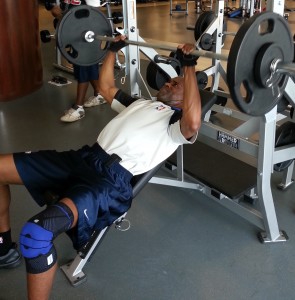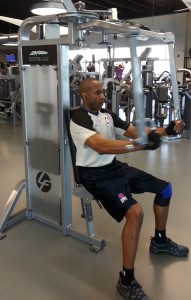by Michelle Sutton-Kerchner
There are times in life when you cannot afford self-pity. Battling a life-threatening disease is one of them. Learn to think like a survivor …
Life delivers the unexpected, from simple setbacks to a frightening diagnosis. Prepare yourself. Cultivate a mindset today that increases resiliency for all of your tomorrows.
A Blessing in Disguise
When member Rodney Robinson received a “clip” to his knee while refereeing a basketball game, he didn’t give it much pause. After three weeks of swelling without improvement and a couple visits to the Emergency Department, the injury began to concern him. A 49-year-old basketball official who can be found on the sidelines of professional games, as well as colleges and local high schools, Rodney kept in great shape. He recognized his healing as inconsistent with the injury’s severity.
Still not feeling well after six weeks, Rodney’s symptoms expanded. He experienced a blackout, extreme fatigue, and lack of appetite. A simple walk to the bathroom one evening exhausted him into alarm. He was hospitalized after another visit to the Emergency Room where immediate attention was given to his rapidly declining state. Within hours, Rodney was diagnosed with leukemia.
“Without the knee injury to alert me, the clock was ticking loudly. I easily could’ve collapsed to my death,” Rodney relates.
Denial
Unable to accept what physicians told him that fated day, Rodney insisted the blood test results got confused. At his request, they performed a follow-up test. The leukemia was confirmed again. Rodney’s white blood cell count was dangerously low. He was told he should have been a human bruise in such a depleted state. He didn’t have enough white blood cells left to fight off the minor knee injury. The medical staff attributed Rodney’s ability to remain alive to his good physical condition. His lifelong commitment to exercise carried him this far.
“I feared leukemia was a death sentence,” Rodney admits. Reassurance from his physicians and research on his diagnosis proved otherwise. “I couldn’t afford self-pity. I decided I wanted to live.” Rodney set his goal: to be running the basketball courts in about five months, back in referee mode. “I convinced myself. I had to convince my mother,” he shared.
The Climb
Although weakened by chemotherapy, Rodney remained focused on his goal. He thought beyond the current situation, emphasizing exercise and other steps needed to accomplish it. His decision to join the Center, with its emphasis on wellness, was immediate. “I couldn’t sit around and feel sorry for myself. I joined the Center where I could focus on total health, in addition to exercise. This wellness community with on-site nurses, physical therapy services, and nutrition expertise is what I needed.”
Rodney’s mind was set, “With the Good Lord’s blessing, I got a second chance. What I did with that opportunity was on me! I was determined to accomplish life. To get the cancer in remission and keep it there.” It was not easy.
Inspired by the late basketball coach Jim Valvano, who also battled cancer, Rodney approached his recovery with Valvano’s famous advice for battling tough situations: Laugh a lot, think, and cry a little. Two months after his hospitalization, Rodney was attempting exercise. A 10-foot jog proved too ambitious. Each day, he increased his steps until he reached the end of his block. He used his progress to gauge when he would be ready for the basketball court.

During this time, Rodney joined the Center where he utilized the physical therapy services to rehabilitate his knee. He graduated to the therapy pool, and created an aerobic and stretching routine. At a twenty-pound bodyweight deficit, Rodney had work to do on the Exercise Floor. His condition was most evident there, allowing him to only bench-press half of his previous weight.
Rodney personifies the cliché, “the power of positive thinking.” Through hope, he was able to recognize his own responsibility in his situation. He never relinquished control, and it was that sense of control that propelled him. “It’s all up to me,” proved a winning attitude. He was determined to heal. His theory, “You have to give it a shot, or your condition will probably worsen.”
True Core Strength
According to health experts, your thought process can turn around life’s traumas. Small steps may seem insignificant, yet they are building blocks and representations of our inner strength to overcome. Rodney witnessed this in his own determination to walk a step further every day until he reached the end of his neighborhood street. He was aware of the excruciatingly small steps in rebuilding his strength. On the Exercise Floor, he increased his own weight and that of the barbells. Yet, his actions–the process of doing, however small– inspired him. It gave him hope and nurtured courage so he could turn steps into yards and miles.
“You cannot battle with yourself. Have faith that things happen for a reason. You must deal with it,” he says. Note Rodney’s words. They resonate how he remains in charge, not his cancer. He takes responsibility to the extent possible. Life dishes out ingredients. You piece them into a recipe, flavored to your mental tastes.
Cry a little: Each person’s reaction to life events, stressors, and fear is unique. Thankfully, resiliency can be cultivated. We’d all like that healthy characteristic to be ours. Resilient people do indeed mourn and indulge in self-pity. However, they don’t let it overtake them.
Laugh a lot: They remember life’s positive moments and recognize the ability to enjoy them again, perhaps in a different way. The process of working through a situation builds confidence and advances toward overcoming it.

Practice healthy habits. This is critical to mental and physical resilience. Many folks come through an accident or tragedy (mental or physical) and attribute a strong, healthy pre-existence as their key to survival. Take time daily for your health. Eat well, sleep enough, and exercise regularly. This provides the fortitude to float rather than sink during times of trouble.
Think: Studies prove the need for mental breaks. Our brains are surprisingly active when we relax and rest, particularly in regions associated with decision-making, memories, and emotional processing. You actually use 30 percent more caloric energy than when using other parts of the brain. Experts infer these mental thought processes improve our ability to solve and respond to problems. Sometimes doing nothing is really something. That’s the foundation of meditation, after all.
Do what you enjoy. Find a way to make the little things happen. Rodney was working to get back into a career that was his passion.
Back in the Game
Rodney met his goal. In January, he was back on the scene. His next goal is to be ready for college basketball season next year. Step by step, he climbs back to the top of his game. Daily Center workouts keep him moving and stress-free.
 In retrospect, Rodney believes he suffered from leukemia for several years. He recalls often being fatigued, even after a full night’s rest. Although he got regular physical exams, he never got a complete blood count (CBC) done. He emphasizes the importance of this blood test, which goes beyond routine checks of cholesterol and sugar levels. “Know everything about your cell/blood counts. It’s amazing what can happen if something is off,” he advises.
In retrospect, Rodney believes he suffered from leukemia for several years. He recalls often being fatigued, even after a full night’s rest. Although he got regular physical exams, he never got a complete blood count (CBC) done. He emphasizes the importance of this blood test, which goes beyond routine checks of cholesterol and sugar levels. “Know everything about your cell/blood counts. It’s amazing what can happen if something is off,” he advises.
“I wake up with energy every day!” Rodney asserts. Back in action, he must end this interview. He is off to officiate another game.
Sources
“The Five Best Ways to Build Resiliency,” by Jessie Sholl, Experience Life, September 2011.
Image Credits
I can (introductory photo): www.flickr.com/photos/bitesizeinspiration/8678161748
Waterfall: http://www.flickr.com/photos/dancingnomad3/7648375086/
 Fitness & Wellness News Your Source for Fitness News, Wellness News, Health News, and Nutrition News!
Fitness & Wellness News Your Source for Fitness News, Wellness News, Health News, and Nutrition News!





Informative and inspiring article. This is a great story to share with someone who may need some positive energy . God bless Rodney with continued good health.
Maureen
Thanks!